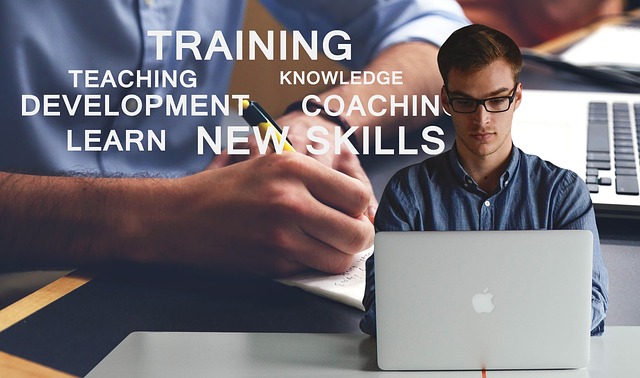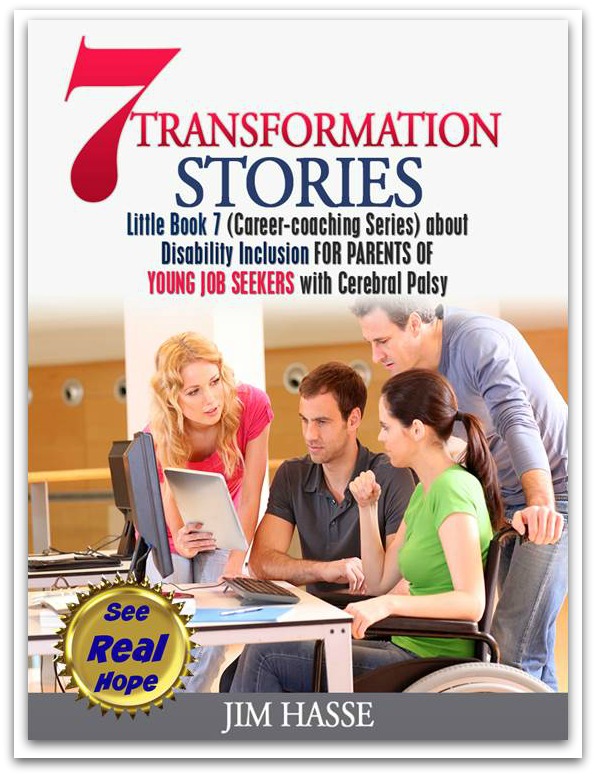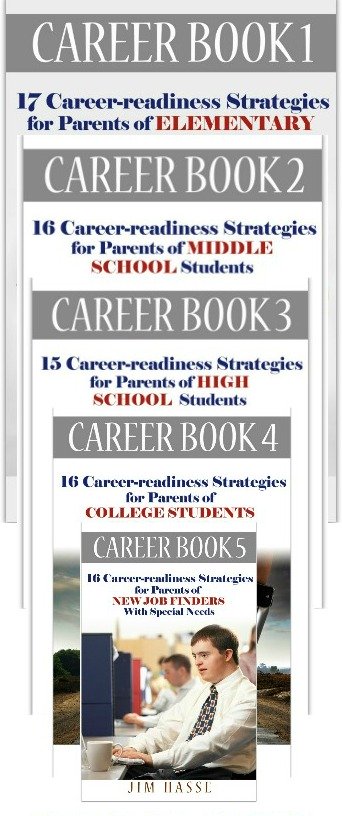Guidance Counseling: Cerebral Palsy Career Builder for Job Seekers
By Jim Hasse, ABC, GCDF, Disability Employment Expert
_________________________________________________________
Guidance counseling has been a part of my life since 1979. Here are four lessons I’ve learned as a result of that experience. Pass them on to the job seeker with cerebral palsy (CP) you’re mentoring.
As both a job seeker and hiring manager for more than three decades, I’ve found that there are essentially four basic skills which can determine how successful a job candidate will be in landing a meaningful job. Those four basic skills are: marketing, advocating, problem solving and negotiating.
Let me briefly indulge again in my fascination with guidance counseling and briefly explain my personal guidelines for developing those four basic skills.

Marketing
A huckster sells or promotes in an aggressive and flashy manner. A job seeker does not need to be a huckster.
But, your new job seeker can’t ignore personal marketing and personal branding, either. In today’s American culture, which puts a premium on individuality, a job seeker needs to identify his or her strengths and passion and develop a personal brand which showcases them in an effective, sincere manner.
Help your new job seeker to be objective about what he or she can offer employers in the light of CP. The trick is to then offer those attributes in a forthright presentation which puts the employer first and your son or daughter second.
My guidance counseling recommendation: Replace the “objective” portion (which is “me” oriented) of a resume with an “offering statement,” which, in one sentence, tells prospective employers what your job seeker can do for them.
An offering statement is brief, reflecting your job seeker’s well-selected accomplishments and skills. Employers are more interested in what your job seeker has to offer than what his or her personal objectives are.
An effective offering statement is the culmination of much reflection and hard work, even though it’s preferably only one or two sentences long.
A good offering statement can drive your job seeker’s entire job marketing campaign.
Advocating
Naked self-promotion has a negative connotation in business circles, where what’s good for the company or organization is paramount. But self-advocacy, starting with a solid understanding of both what your job seeker can do for a potential employer and what tools he or she needs to do the job, is vital.
So, help your job seeker practice
leveling with prospective employers, saying, in essence, “This is what I need
to do an effective job for you, and here’s how I can help you get what I need
at a reasonable cost and at not a lot of time on your part.” In other words,
your new job seeker needs to be a self-advocate with the authenticity valued in
today’s business world.
What essential job skills
do you see developing in your young job seeker
that can outshine disability?
Join PACER’s Facebook
discussion.
At no time should a job seeker with a disability beg for a job by falling back on the cliché of “all I need is just one break.”
My guidance counseling principle: Your job seeker with CP needs to make his or her own breaks by effectively preparing for a job, mastering effective job marketing techniques and pointing out to targeted employers why he or she is the best person for a particular job.
Problem solving
Imagination and daydreaming are fine pastimes, but what counts in business is applied creativity. Everyone can be creative, but not everyone is adept at applying creativity to personal challenges or on-the-job situations.
Problem solving is the ability to tap creativity for relieving a pain or paving the way to a gain -- either on a personal level or within a corporate setting.
Your job seeker needs to demonstrate problem-solving ability in both areas, if possible. For instance, maybe your son or daughter can show how he or she has harnessed technology to live well with CP. How can that same ingenuity be used to adapt to workplace requirements and help a company take advantage of often unseen opportunities?
The more specific your job seeker can get in this regard the better. Having the demonstrative ability to find the right match between need and solution will give him or her an important edge over fellow job seekers.
That may seem like a tough guidance counseling principle, but let me explain.
When I first started working for eSight Careers Network in 1999 as senior content developer (a full-time employee), for instance, I was quite well versed about how to work within a “virtual” team, which I did for 10 years (between 1999 and 2009).
I was in Wisconsin, my boss was in New York City and I was supervising a group of part-time freelance writers who were based in Seattle, WA, Chicago, IL, Buffalo, NY and Harrisburg, PA. Together, we researched, wrote, edited and published online more than 1,000 articles about disability employment issues.
We also launched some of the first blogs about disability employment, allowing job seekers across the globe, many of them without easy access to in-person networking opportunities, to share their views about a whole range of employment issues.
I credit part of our success as a virtual team leader to my experience in solving a problem I encountered while working with a Fortune 500 dairy cooperative during the 1980s when the Internet was still in its infancy.
Our CEO had a priority of personally meeting with our dairy farmer member-owners each year during a series of 36 district meeting across three Midwestern states. In doing so, he received lots of valuable feedback. But, it also meant he was out of his office for up to 30 days each winter, driving to small towns to personally attend these meetings.
My own concerns about personal mobility and my best use of my time due to my CP helped me identify with my CEO’s predicament.
Under my leadership, our corporate communication department obtained equipment so our CEO could make a presentation and conduct a Q&A session with members at each district meeting from his office, saving him time, money and effort. It was the forerunner of today’s webinar. I was learning how to work with a “virtual” team before the “cyberspace revolution” occurred.
My guidance counseling principle: Encourage your new job seeker to use brief stories to trace the evolution of his or her problem-solving abilities – and trace that evolution, if possible, to what he or she has learned as a result of effectively coping with CP.
Negotiating
Instead of approaching an employment opportunity as an underdog due to a perceived weakness (either as a personal perception or a false assumption on the part of a prospective employer), your new job seeker needs to develop negotiating skills designed to approach decisions about employment conditions, benefits and salary from a position of strength.
After all, as a job candidate, your son or daughter is selling his or her skills, experience and attributes, and the prospective employer is buying them.
Although I think I have an ample
measure of self-esteem and a long history of success in the mainstream job
market, I find that I sometimes miss opportunities to effectively negotiate
terms of an arrangement that could be even more beneficial to me. I often
overlook the critical dynamics of a situation. I don't take my own guidance counseling advice.
Maybe it’s because I’m frequently so involved in what I can do in sidestepping personal obstacles associated with my CP that I get preoccupied by the “big picture” of what is happening and forget about tying up the details in my favor.
That just happened recently when my wife, Pam, and I leased a new car. We thought we had the deal tied up by telephone before we got to the dealership, but then our favorite color was not available except on a “demonstrator” and that threw a new set of figures at me. I missed an opportunity to further negotiate in the light of these new factors.
My guidance counseling recommendation
for your new job seeker: Take courses in negotiation, read books about negotiation
and practice your negotiating skills. Knowing (and demonstrating) how to
negotiate effectively for what you want, need and deserve in terms of salary,
benefits and accommodations will make you a stronger job candidate and a more
effective employee.
What essential job skills
do you see developing in your young job seeker
that can outshine disability?
Join PACER’s Facebook
discussion.
Return from Guidance Counseling to
Job Finder
Go to Cerebral Palsy Career Builders
This is Creative Commons content. You can freely and legally use, share and repurpose it for non-commercial purposes only, provided you attach this sentence and the following attribution to it (including the two links):
Originally written and illustrated by Jim Hasse, ABC, GCDF, owner of Hasse Communication Counseling, LLC, who, as a person with cerebral palsy, served for 10 years as a vice president in a Fortune 500 company during his 29-year career in corporate communication. He’s an Accredited Business Communicator, certified as a Global Career Development Facilitator and author of 14 Amazon books about disability awareness and disability employment issues.





